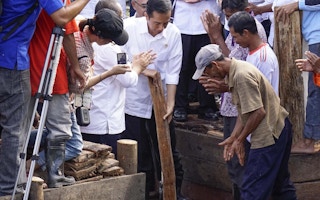Indonesia’s new president Joko ‘Jokowi’ Widodo has promised to restore peatlands and crack down on companies which continue to clear active forests and peatlands to plant monoculture crops such as acacia and palm oil.
To continue reading, subscribe to Eco‑Business.
There's something for everyone. We offer a range of subscription plans.
- Access our stories and receive our Insights Weekly newsletter with the free EB Member plan.
- Unlock unlimited access to our content and archive with EB Circle.
- Publish your content with EB Premium.
During a visit to Riau, Sumatra, on Thursday to observe the ongoing initiatives in the province concerning the handling of forest fires, Jokowi met a group of sago farmers in Sungai Tohor, a village in the Meranti island regency where several areas have been converted to monoculture crops plantation.
Jokowi told the media: “I have told the minister of environment and forestry to review the licenses of the companies that have converted peatlands into monoculture plantations if they are found damaging the ecosystem.”
He also commented that peatlands are best given to the community to be managed. “Community management is usually environmentally friendly, but if it’s given to companies it is turned into monocultures like acacia and oil palm,” he added.
Acacia are grown in plantations to make pulpwood, the raw material used for making paper and other packaging materials, while palm oil is widely used in many consumer products - from food to cosmetics to biofuels.
President Jokowi also joined the local community of Sungai Tohor to dam a canal, which aims to block the draining of a peat forest near the area. Canal-blocking and construction of dams are seen by forestry experts to be an effective way to restore water in peatlands and reduce further drainage. “This canal dam, initiated by the community, is very good, and must be made permanent,” he said.
“
Peatlands can’t be underestimated, they must be protected because they constitute a special ecosystem, and it is not only deep peat that must be protected, but all peat areas
Joko Widodo, president of Indonesia
Recent research by forest scientists at the Indonesia-based Center for International Forestry Research found that the main cause of haze in Riau comes from dried and deforested peatlands, and not just the slashing-and-burning of forested areas, as commonly thought.
David Gaveau, a CIFOR researcher, said peat swamps in their natural state are resistant to fire because they are wet underground, but they can be highly flammable when they are dried and degraded.
“Our observations show that extreme air pollution episodes in Southeast Asia are no longer restricted to drought years. We expect major haze events to be increasingly frequent because of ongoing deforestation of Indonesian peatlands,” Gaveau and his co-authors noted in their 2013 study conducted in Sumatra and published in Scientific Reports last August.
Environmental campaign group Greenpeace saw the president’s move as a clear intent to decisively tackle deforestation and the haze pollution brought about by forest fires in Sumatra.
When asked about whether he would strengthen the regulations for the protection of peatlands, the president replied that he has already given such instructions to the forestry minister, Greenpeace said in a statement.
“That’s right, yesterday I instructed the Minister. Peatlands can’t be underestimated, they must be protected because they constitute a special ecosystem, and it’s not only deep peat that must be protected, but all peat areas,” stressed Jokowi.
Jokowi’s moves follow that of his predecessor, Susilo Bambang Yudhoyono, who implemented a landmark forest moratorium during his 10-year term which ended last October.
During a forest summit held in Indonesia last May, Yudhoyono, now the chairman of the Seoul-based Global Green Growth Institute, urged his successor to extend the forest protection policies he has put in place, particularly the moratorium which bans the clearing of forests and peat swamps for plantations and other agricultural purposes in Indonesia.
Before the end of his term, Yudhoyono had extended the moratorium, which aims to protect more than 63 million hectares of rainforests, until 2015.
Separately, environment and forestry minister Siti Nurbaya told Antara News on Tuesday that the license moratorium on industrial forest concessions will continue while evaluation on problematic licenses are being carried out.
Longgena Ginting, Greenpeace Indonesia’s country director, expressed her hopes that Jokowi’s announcement is a sign of things ahead for the protection of forests in Indonesia.
“The country’s existing peatland regulations are weak and poorly enforced. We look to Jokowi now to take clear action to stop expansion by industry into peatlands, to crack down on illegality and to support the permanent protection of peatland landscapes,” said Ginting.
Local NGO group WALHI or the Indonesian Forum for the Environment also hailed Jokowi’s move. WALHI executive director Abetnego Tarigan said that the president must make sure the visit would be followed by “concrete actions” in the form of firm law enforcement.
Ahead of the UNFCCC climate negotiations in Peru this week, Kumi Naidoo, Greenpeace International’s executive director, commented that Jokowi has “wasted no time stepping into an international leadership role”. “I welcome President Joko Widodo’s vision for peatland protection, which has the potential to slow Indonesia’s greenhouse gas emissions,” he noted.








